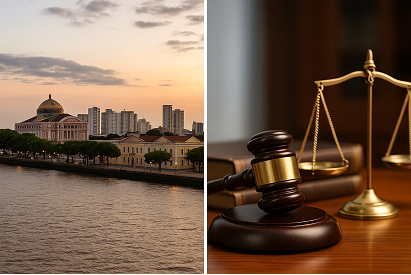Rio de Janeiro
Av. Presidente Wilson, 231 / Salão 902 Parte - Centro
CEP 20030-021 - Rio de Janeiro - RJ
+55 21 3942-1026

In northern Brazil—including the states of Amazonas, Pará, Rondônia, Roraima, Amapá, and Tocantins—family reunification visas play a crucial role in supporting immigrant families. Brazilian immigration law permits foreign relatives of Brazilian citizens or legal residents to obtain lawful residency through a structured and legally protected process.
This process is governed by the Brazilian Migration Law (Law No. 13.445/2017) and its regulatory decrees, ensuring access to family unity, personal stability, and socioeconomic integration.
The visa is available to legally recognized spouses, minor children, financially dependent adult children, parents, legal guardians, and dependent siblings. Same-sex marriages and registered domestic partnerships are fully recognized under Brazilian law.
Each relationship must be evidenced through official documents, such as birth certificates, marriage certificates, or legal guardianship decisions, which must be apostilled and translated into Portuguese by sworn translators.
In the Northern states, the process involves local branches of the Federal Police and cooperation with notaries and civil registries. Some regions may lack infrastructure, making legal representation crucial to navigate bureaucratic challenges, especially in remote areas such as the interior of Amazonas or rural Amapá.
Lawyers also coordinate document preparation and translation, ensuring documents meet federal requirements even where local resources are limited.
Given the North's geographic and infrastructural diversity, legal professionals play a vital role in managing the process efficiently. They help families avoid common pitfalls, secure sworn translators, and liaise with civil registries in remote jurisdictions.
Legal assistance ensures compliance with immigration rules and offers faster, more reliable approvals.
After the visa is granted, legal counsel can assist with municipal registration, school enrollment for minors, tax ID (CPF), banking, and access to healthcare (SUS). Additionally, lawyers support the transition to permanent residency and future naturalization applications.
This guidance is particularly critical in Amazonian cities and areas lacking digital access to federal services.
1. Who can apply for the family reunion visa in Brazil?
Spouses, minors, dependent adult children, parents, and legal dependents.
2. Is it possible to apply from within Brazil?
Yes. If already in Brazil, the process is initiated at the Federal Police.
3. Do I need to translate my documents?
Yes. A sworn translator in Brazil must translate all foreign documents.
4. Are same-sex partners eligible?
Yes. Same-sex marriage and partnerships are equally recognized.
5. How long does the visa process take?
Generally between 3 and 6 months.
6. What is the CRNM?
It is the National Registry card for migrants in Brazil.
7. Can I work with a family reunion visa?
Yes. Work is permitted after registration.
8. What if the applicant has criminal records?
A clean background is generally required.
9. Do all family members need separate applications?
Yes. Each individual must submit a separate application.
10. What happens if I move to another state?
You must update your registration with the new Federal Police unit.
11. Are apostilles required?
Yes. All foreign documents must be apostilled.
12. Is the visa renewable?
Yes. It may also lead to permanent residency.
13. Can I apply while my tourist visa is valid?
Yes, provided you initiate the request before your visa expires.
14. Do children receive healthcare access?
Yes, once registered, they can access public services.
15. Can lawyers submit applications on behalf of clients?
Yes, with a notarized and translated power of attorney.
16. What if my documents are missing?
You may need to request replacements from the issuing country.
17. Will I need to pay fees?
Yes, application and registry fees may apply.
18. Can I include my parents as dependents?
Yes, if they are financially dependent and documented.
19. Do I need to show proof of income?
Yes. The sponsor must demonstrate financial stability.
20. Where can I get help with the application?
Please send an email to [email protected]
 Mr. Alessandro Jacob speaking about Brazilian Law on "International Bar Association" conference
Mr. Alessandro Jacob speaking about Brazilian Law on "International Bar Association" conference Av. Presidente Wilson, 231 / Salão 902 Parte - Centro
CEP 20030-021 - Rio de Janeiro - RJ
+55 21 3942-1026
Travessa Dona Paula, 13 - Higienópolis
CEP -01239-050 - São Paulo - SP
+ 55 11 3280-2197